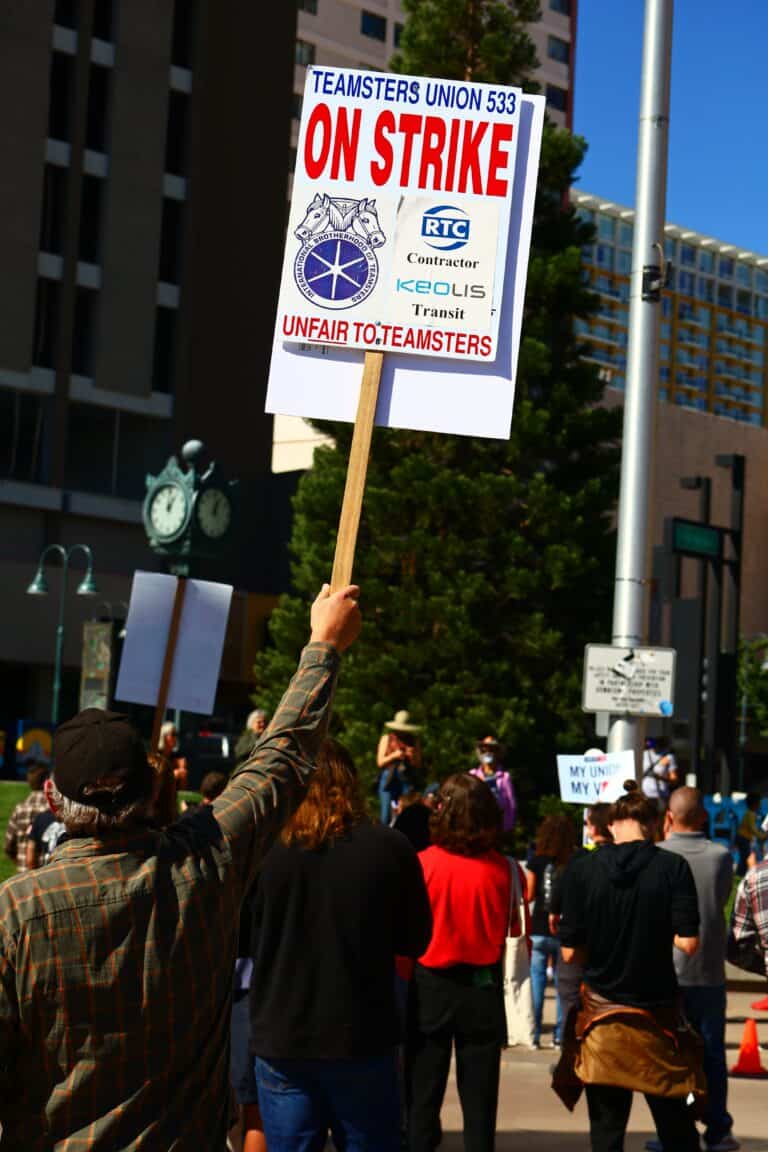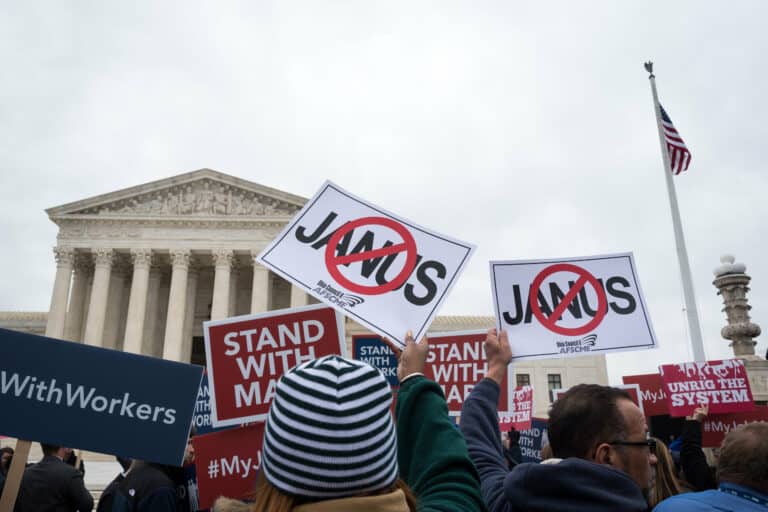Ana Virginia Moreira Gomes is a Professor of Law at the University of Fortaleza
Stanley Arthur Gacek is the Senior Advisor for Global Strategies for the UFCW. Previously, he was the Deputy and Interim Director of the ILO Office in Brazil from 2011-2016
There has been an ironic convergence over the last two years between Brazil and the United States in relation to the law governing trade union financing. The entire public sector and much of the private sector are currently so-called “right to work” in the U.S., mirroring what has become an overwhelming “right to work” regime in Brazil. The misnomer alone is an indicator of the insidious nature of forces determined to further diminish union power in American and Brazilian workplaces. This convergence is notable, despite continuing differences regarding other aspects of labor relations and trade union structure. For many years, labor relations law in Brazil and the United States represented two distinct and highly divergent models, with the Brazilian case identified with state corporatism, and the American reality associated with the ideal type of liberal contractualism. [1]
What is the significance of Brazil to U.S. unionists?
Brazil is the fifth largest nation in the world in terms of population, with over 211 million inhabitants and a labor force of well over 100 million. The U.S. is a major source of foreign direct investment, and continues as the largest importer of Brazilian manufactured goods with value-added. Jair Bolsonaro and Donald Trump have discussed the possibility of initiating Brazil-U.S. FTA talks.
Brazilian multinational enterprises have expanded operations in North America. For example, JBS Friboi is the largest producer of animal protein in the world and is now the leading employer of UFCW packinghouse workers.
U.S. labor leaders considered Brazilian unions as powerful and reliable partners for the purposes of result-oriented solidarity, and especially during the administration of former union leader President Lula (2003 – 2011), followed by the progressive government of President Dilma Rousseff (2011 – 2016). With the impeachment and removal of President Rousseff in 2016, amounting to a parliamentary coup, followed by the neo-liberal Michel Temer administration, and culminating with the alt-right Bolsonaro regime coming to power in January of 2019, Brazilian labor law and its guarantees were targeted for a complete overhaul, enabling a total deconstruction of union organization and collective bargaining.
Prior to the radical neo-liberal labor law reform of 2017, the Brazilian union structure and collective bargaining system were very different, and very distinct from the U.S. reality. There was a guaranteed income stream mandated by law for the unions in Brazil called the contribuição sindical (or trade union tax), amounting to one day’s pay per year and collected from all workers covered by the monopoly union structure (governed by the principle of unicidade – only one union for a given professional category (i.e., bank workers) and for a geographical area not inferior to a municipality), and regardless of whether or not the workers were voluntary members. Although the CLT (Consolidation of Labor Laws – Brazil’s Labor Code) stipulates that the contribuição only can finance social welfare services for the union membership (such as medical and legal services), the Brazilian labor movement often applied the proceeds for other trade union purposes, and especially during less repressive governments.
In addition to the contribuição sindical, there had been the practice of contribuições assistenciais, which depended entirely on collective bargaining and were approved by workers’ assemblies. The unions used the proceeds for any legitimate trade union purpose, and the dues were collected from both the members and non-members in many cases, until the TST (Superior Labor Court) invalidated collection from non-members several years ago. The contribuição assistencial is similar to the practice of union security or agency fee in the United States. Another financial source is the contribuição associativa –dues paid voluntarily by the members. Some of the larger and stronger unions had relied more on the Brazilian equivalents of union security financing and voluntary dues, rather than the trade union tax.
In spite of the former structural chasm between the Brazilian and U.S. systems, there is now an ironic coincidence. The compulsory contribuição sindical was terminated by the 2017 reform of the CLT, and the constitutionality of that elimination was upheld by the STF (Supreme Federal Court) in 2018.[2] The 2017 reform also proscribes any practice of contribuições assistenciais unless there is an express authorization from the individual worker for their collection. The combined effect of these measures now invalidates over 90 percent of what had been the financial base of Brazilian trade unions.
And with 28 states in the U.S. with divisive “right to work” laws and agency fee structures being constitutionally overturned in the public sector thanks to the U.S. Supreme Court’s decision in Janus v. AFSCME Council 31, 588 U.S.__(2018), the labor movements of both Brazil and the United States are contending with a common “right to work” reality.
Curiously, STF Justice Luis Fux cited Janus to justify his decision upholding the constitutionality of the 2017 labor law reform’s abolition of the compulsory contribuição sindical. His citation is totally inapposite for the following reasons: 1- Janus (unlike the STF’s decision) applies exclusively to public employees given the uniquely First Amendment issues involved; 2- the agency fee system for state, county and municipal employees rendered unconstitutional in Janus is totally unlike the contribuição sindical, since it was the product of collective bargaining relationships between public employee unions and public employers. The contribuição sindical had been mandated by legislative fiat. Such a difference is critical in terms of international law. ILO jurisprudence says that union security type clauses, if they are permitted by national legislation and practice, do not violate the principle of freedom of association found in Convention 87, provided they are the product of collective bargaining, and are not imposed automatically by law.
For the first time in decades, the Brazilian union movement must now convince individual workers to authorize dues contributions in order to survive financially. It is too early to say how the Brazilian unions will cope. Some are relying on those regional labor prosecutors and labor courts (as well as employers) who are respecting union-security type clauses bargained collectively and approved in workers’ assemblies. Some are attempting to organize more aggressively in order to expand voluntary membership, including with the offer of social welfare assistance provided by the sindicatos. However, such benefits were made possible by the trade union tax, which is now prohibited. Moreover, the COVID-19 pandemic is making in-person organizing in Brazil exceedingly difficult, as is the case in the U.S. and throughout the world.
The UFCW and other North American unions have been engaged in strategic dialogues with their Brazilian counterparts over the last two years on the best means to cope with a right to work for less environment. Practical Brazilian-U.S. labor solidarity is more imperative than ever before.
[1] See Stanley Gacek and Ana Virginia Gomes, Sistemas de Relações de Trabalho: Exame dos Modelos Brasil-Estados Unidos, Segunda Edição, Editora LTr, Brasil, 2015
[2] BRASIL/STF. Ação Direta de Inconstitucionalidade de nº 5794. Disponível em http://portal.stf.jus.br/processos/detalhe.asp?incidente=5288954.










Daily News & Commentary
Start your day with our roundup of the latest labor developments. See all
April 26
Starbucks and Workers United resume bargaining talks; Amazon is ordered to disclose records; Alabamians support UAW’s unionization efforts.
April 25
FTC bans noncompete agreements; DOL increases overtime pay eligibility; and Labor Caucus urges JetBlue remain neutral to unionization efforts.
April 24
Workers in Montreal organize the first Amazon warehouse union in Canada and Fordham Graduate Student Workers reach a tentative agreement with the university.
April 23
Supreme Court hears cases about 10(j) injunctions and forced arbitration; workers increasingly strike before earning first union contract
April 22
DOL and EEOC beat the buzzer; Striking journalists get big NLRB news
April 21
Historic unionization at Volkswagen's Chattanooga plant; DOL cracks down on child labor; NY passes tax credit for journalists' salaries.